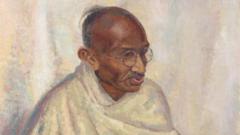A distinctive oil portrait of Mahatma Gandhi, painted in the UK in 1931, is scheduled for auction at Bonhams in London next month. This artwork not only depicts the revered Indian independence leader but also commemorates a pivotal period in history when Gandhi was actively advocating for India’s self-governance.
The portrait, believed to be the only oil painting for which Gandhi actually posed, was crafted by Clare Leighton during Gandhi’s visit to London for the Second Round Table Conference. This meeting focused on discussions surrounding constitutional reforms in India during British rule. Bonhams emphasizes the cultural and historical importance of the piece, suggesting it merits a wider audience and appreciation, especially in India.
Caspar Leighton, nephew of the artist, recounted how Clare was granted rare access to Gandhi, allowing her to draw his likeness on multiple occasions. This portrait was part of a collection that remained with the artist until her passing in 1989 in the United States. Leighton became acquainted with Gandhi through her partner, journalist Henry Noel Brailsford, a prominent supporter of the Indian independence movement.
In November 1931, Leighton showcased her portraits, including this oil painting, at an exhibition in London’s Albany Galleries. Although Gandhi did not attend, numerous representatives of the Indian delegation were present, including notable independence figure Sarojini Naidu.
Prominent British journalist Winifred Holtby described the portrait, remarking on Gandhi’s expressive demeanor captured in the painting. His personal secretary, Mahadev Desai, later received positive feedback on the likeness from viewers at the exhibition.
Following a lengthy period without public display, the portrait was reportedly exhibited at the Boston Public Library in the late 1970s. Tragically, it suffered damage during an alleged attack by a right-wing Hindu extremist, stemming from tensions surrounding Gandhi’s legacy post-Partition. The artwork underwent restoration in 1974, ensuring it remains a treasured artifact of both artistic and cultural significance.
This auction not only highlights the relevance of Gandhi's ideologies today but also represents a confluence of art and history that continues to resonate deeply within the fabric of Indian culture and identity.



















